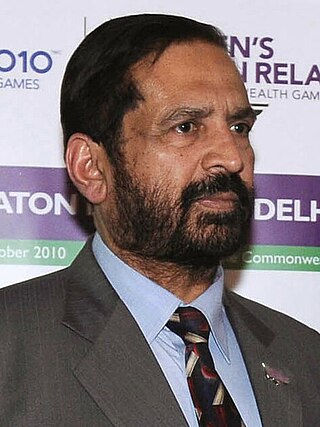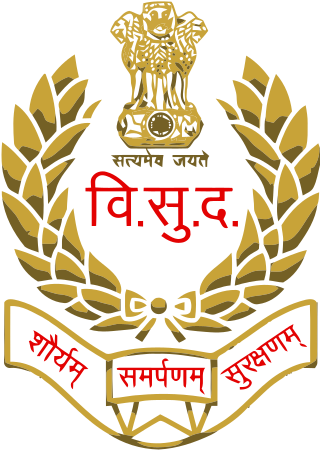Related Research Articles

The prime minister of India is the head of Union Council of Ministersof the Republic of India. Executive authority is vested in the prime minister and his chosen Council of Ministers, despite the president of India being the nominal head of the executive. The prime minister has to be a (nominated) member of one of the houses of bicameral Parliament of India, alongside heading the respective house. The prime minister and his cabinet are at all times responsible to the Lok Sabha.

Rajiv Gandhi was an Indian politician who was the prime minister of India from 1984 to 1989. He took office after the assassination of his mother, then–prime minister Indira Gandhi, to become at the age of 40 the youngest Indian prime minister. He served until his defeat at the 1989 election, and then became Leader of the Opposition, Lok Sabha, resigning in December 1990, six months before his own assassination.

The Central Bureau of Investigation (CBI) is the domestic crime investigating agency of India. It operates under the jurisdiction of the Ministry of Personnel, Public Grievances and Pensions. Originally set up to investigate bribery and governmental corruption, in 1965 it received expanded jurisdiction to investigate breaches of central laws enforceable by the Government of India, multi-state organised crime, multi-agency or international cases. CBI is exempted from the provisions of the Right to Information Act. CBI is India's officially designated single point of contact to act as the liaison with Interpol. The CBI headquarter is located in CGO Complex, near Jawaharlal Nehru Stadium in New Delhi.

The Bofors scandal was a major weapons-contract political scandal that occurred between India and Sweden during the 1980s and 1990s, initiated by Indian National Congress politicians and implicating the Indian prime minister, Rajiv Gandhi, and several other members of the Indian and Swedish governments. These politicians were accused of receiving kickbacks from Bofors AB, an arms manufacturer principally financed by the Wallenberg family's Skandinaviska Enskilda Banken, for winning a bid to supply to India the company's 155 mm field howitzer – the sale of 410 field howitzers, and a supply contract for almost twice that amount, totalling a US$1.4 billion deal. It was the biggest arms deal ever in Sweden, and money marked for development projects was diverted to secure this contract at any cost. The investigations revealed flouting of rules and bypassing of institutions.

Inder Kumar Gujral was an Indian diplomat, politician, and anti-colonial independence activist, who served as the prime minister of India from April 1997 to March 1998.

7, Lok Kalyan Marg (7LKM), formerly 7, Race Course Road, is the official residence and principal workplace of the Prime Minister of India. Situated on Lok Kalyan Marg, New Delhi, the official name of the Prime Minister's residence complex is Panchavati. It is spread over 4.9 hectares of land, comprising five bungalows in Lutyens' Delhi, built in the 1980s, which are the Prime Minister's office, residency zone and security establishment, including one occupied by Special Protection Group (SPG) and another being a guest house. However, even though there are 5 bungalows, they are collectively called 7, Lok Kalyan Marg. It does not house the Prime Minister's Office but has a conference room for informal meetings.

Suresh Kalmadi is an Indian politician and senior sports administrator. He is a former member of the Indian National Congress. He was a member of parliament from Pune until May 2014. He is alleged to have been involved in corrupt practices in relation to the 2010 Commonwealth Games during his tenure as president of Indian Olympic Association and chairman of Commonwealth Games 2010. He was charged with conspiracy, forgery, misconduct and under provisions of the Prevention of Corruption Act and later arrested for the same in April 2014, but has not yet faced trial. In December 2016, the Indian Olympic Association (IOA) named Suresh Kalmadi as its lifetime patron. However, he refused to accept the post until he was able to clear his name.

The Special Protection Group (SPG) is an agency under the Cabinet Secretariat of the Government of India, whose sole responsibility is protecting the prime minister of India and, in some cases, his or her family. It was formed in 1988 by an Act of the Parliament of India. The agency protects the prime minister at all times, both in India and abroad, as well as the prime minister's immediate family members. Family members, however, may decline security.
Ottavio Quattrocchi was an Italian businessman who was being sought until early 2009 in India for criminal charges for acting as a conduit for bribes in the Bofors scandal. Quattrocchi's role in this scandal, and his proximity to Indian prime minister Rajiv Gandhi through his wife Sonia Gandhi, is thought to have contributed to the defeat of the Congress Party in the 1989 elections. In 1999, the Central Bureau of Investigation (CBI) named Quattrocchi in a chargesheet as the conduit for the Bofors bribe. The case against him was strengthened in June 2003, when Interpol revealed two bank accounts, 5A5151516M and 5A5151516L, held by Quattrocchi and his wife Maria with the BSI AG bank, London, containing Euros 3 million and $1 million, a "curiously large savings for a salaried executive". In January 2006, these frozen bank accounts were unexpectedly released by India's law ministry, apparently without the consent of the CBI which had asked for them to be frozen.

Padinjarethalakal Cherian Alexander was an Indian Administrative Service officer of 1948 batch who served as the Governor of Tamil Nadu from 1988 to 1990 and as the Governor of Maharashtra from 1993 to 2002. He was considered as a candidate for the post of the President of India in 2002. During his time in Maharashtra, he had additional charge of Goa from 1996 to 1998. He was also a member of the Rajya Sabha representing Maharashtra as an independent candidate from 29 July 2002 to 2 April 2008.

Brajesh Chandra Mishra was an Indian diplomat from the Indian Foreign Service and politician, best known for serving as Prime Minister Atal Bihari Vajpayee's principal secretary and India's first National Security Advisor from 1998 to 2004. He received Padma Vibhushan for his contributions.

The assassination of Rajiv Gandhi, former prime minister of India, occurred as a result of a suicide bombing in Sriperumbudur in Tamil Nadu, India on 21 May 1991. At least 14 others, in addition to Gandhi and the assassin, were killed. It was carried out by 22-year-old Kalaivani Rajaratnam, a member of the banned Sri Lankan Tamil separatist rebel organization Liberation Tigers of Tamil Eelam (LTTE). At the time, India had just ended its involvement, through the Indian Peace Keeping Force, in the Sri Lankan Civil War.

Also referred to as the AgustaWestland VVIP chopper deal, the Indian helicopter bribery scandal by Congress led UPA Government refers to a multimillion-dollar corruption case in India, wherein money was paid to middlemen and Indian officials in 2006 and 2007 to purchase helicopters for high level politicians. As per the CBI, this amounted to ₹2.5 billion (US$29 million), transferred through bank accounts in the UK and UAE.

The Accidental Prime Minister is a 2019 Indian Hindi-language film directed by Vijay Ratnakar Gutte and written by Mayank Tewari, based on the 2014 memoir of the same name by Sanjaya Baru. It was produced by the Bohra Bros under Rudra Production (UK), in association with Jayantilal Gada under the banner of Pen India Limited. It stars Anupam Kher as Dr. Manmohan Singh, the 13th Prime Minister of India from 2004 to 2014 under the United Progressive Alliance.

AJL-National Herald Panchkula land grab scam case, allegedly against Bhupinder Singh Hooda currently in the Punjab and Haryana High Court, is under investigation by the Central Bureau of Investigation (CBI) and Enforcement Directorate (ED). This case pertains to Hooda's alleged role for misusing his position as then Chief Minister of Haryana to cause wrongful gains to the Associated Journals Limited (AJL) and corresponding loss to the Government of Haryana, by illegally allotting a government plot of land worth several crores rupees (billions) to AJL for INR 59 lakh. Then Chief Minister, Hooda, was also the chairman of HUDA, a government entity which re-allotted the plot to AJL in 2005 in violations of rules and against the advice of the HUDA officials. Chief Minister Manohar Lal Khattar's BJP government of Haryana transferred the case to CBI, and CBI filed the FIR in April 2016. CBI booked Hooda for criminal conspiracy, criminal breach of trust, cheating and misuse of official position by public servants. AJL, which also owns National Herald, is controlled by the Indian National Congress leaders Sonia Gandhi and Rahul Gandhi among others.

Sonepat-Kharkhoda Industrial Model Township land case being investigated by the Central Bureau of Investigation (CBI) against Bhupinder Singh Hooda. This under-investigation scam pertains to acquisition of 700 acre land in 3 villages near Kharkhoda in Sonepat district for the Industrial Model Township.. Punjab and Haryana High Court in March 2013 and the Supreme Court of India in May 2016 had cancelled the government's decision to release land to the private builder. Two senior officials in then Chief Minister Hooda's office were indicted for allegedly favouring the developers. Subsequently, in 2018 the Government of Haryana referred the case to CBI to investigate the against Hooda and others.

Haryana Forestry scam case is a multi-crore fake plantation scam allegedly involving Bhupinder Singh Hooda, Kiran Chaudhary and others where government money was embezzled. In 2009, this scam was exposed by the whistleblower, Sanjiv Chaturvedi, Ramon Magsaysay Award-winner Indian Forest Service officer with then Government of Haryana, who filed a case in September 2012 to seek Supreme Court's instructions to CBI to investigate the case. Earlier, Haryana Government had suspended him in 2007 for acting against illegal felling of trees and poaching in Saraswati Wildlife Sanctuary, but his suspension was revoked by the President in 2008 and the chargesheet was overturned in 2011 on an appeal against the decision of Haryana government. An inquiry committee of the Ministry of Environment & Forest (MoEF) found Chaturvedi's allegations against Haryana government true, preferred an inquiry by Central Vigilance Commission and by CBI into dubious role of certain highly placed politicians and civil servants. CBI, in its reply to CVC, found Chaturvedi's allegations against then Haryana Government creditable enough for an independent inquiry. As per the rules, CBI can not undertake suo motu investigation, only state government, high court or supreme court can ask CBI for it.

The Principal Secretary to the Prime Minister of India is the administrative head of the Prime Minister's Office. The officeholder is generally a civil servant, commonly from the Indian Administrative Service and occasionally from the Indian Foreign Service.
References
- 1 2 3 "India Today High and Mighty power list 2013: Top 10 officials -". India Today. 2013. Retrieved 14 May 2014.
- ↑ "Nair appointed advisor to PM, Pulok Chatterji as Principal Secretary". The Hindu. Chennai, India. 28 July 2011.
- ↑ "Pulok Chatterji is principal secretary to PM, Nair adviser". The Times of India . 29 July 2011. Archived from the original on 1 November 2011.
- ↑ "Pulok Chatterjee, close Sonia associate, joins PMO as Principal Secy". Indian Express. 3 October 2011. Retrieved 14 May 2014.
- ↑ "Profiles: Pulok Chatterjee". Outlook. 23 April 2007. Retrieved 14 May 2014.
- 1 2 Sandeep Bamzai (19 August 2011). "Family Choice: Pulok Chatterji tainted by scams before taking over as principal secretary to PM". India Today . Retrieved 15 October 2011.
- ↑ Bamzai, Sandeep (19 August 2011). "Pulok Chatterji tainted by scams before taking over as principal secy to PM". India Today. Retrieved 10 November 2019.
- ↑ "PM's secretary behind tampering of coal report: Jaitley". News18. Retrieved 10 November 2019.
- ↑ "The PMO, the coal scam, the missing sentence and the CBI". Rediff. Retrieved 10 November 2019.